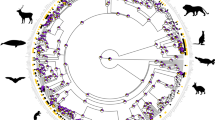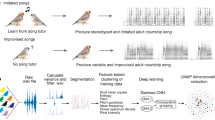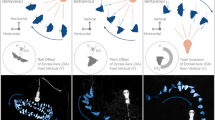Abstract
WHEN Pieris rapæ L. was photographed under the illumination of ultra-violet light passing through the filter UV-D1 obtained from the Matsuda Lamp Co., the wings of female butterflies, in accordance with the description of Frank Lutz1, showed a white image, for they reflected the light, whereas those of male butterflies gave a black shadow because they absorbed the ultra-violet light strongly, as seen in the accompanying photograph (Fig. 1); this is in striking contrast to photographs taken in daylight (Fig. 2). Experiments carried out to elucidate the mechanism of this phenomenon showed that it is due to the difference of pterin content between the male and the female wings.
This is a preview of subscription content, access via your institution
Access options
Subscribe to this journal
Receive 51 print issues and online access
$199.00 per year
only $3.90 per issue
Buy this article
- Purchase on Springer Link
- Instant access to full article PDF
Prices may be subject to local taxes which are calculated during checkout
Similar content being viewed by others
References
Cf. Yagi, Shizen (Japanese), 7, No. 1, 69 (1952).
Good and Johnson, Nature, 163, 31 (1949).
Author information
Authors and Affiliations
Rights and permissions
About this article
Cite this article
MAKINO, K., SATOH, K., KOIKE, M. et al. Sex in Pieris rapæ L. and the Pteridin Content of their Wings. Nature 170, 933–934 (1952). https://doi.org/10.1038/170933a0
Issue Date:
DOI: https://doi.org/10.1038/170933a0
This article is cited by
-
A transposable element insertion is associated with an alternative life history strategy
Nature Communications (2019)
-
Multiple function of pteridines in Drosophila I. Specific fluorescent patterns in three sibling species
Genetica (1981)
-
Ultraviolet reflection and its behavioral role in the courtship of the sulfur butterflies Colias eurytheme and C. philodice (Lepidoptera, Pieridae)
Behavioral Ecology and Sociobiology (1978)
-
The use of visual cues in sexual and species discrimination by males of the small sulphur butterflyEurema lisa (lepidoptera, pieridae)
Journal of Comparative Physiology ? A (1977)
-
Studies on the mating behavior of the White Cabbage Butterfly, Pieris rapae crucivora Boisduval
Zeitschrift f�r Vergleichende Physiologie (1970)
Comments
By submitting a comment you agree to abide by our Terms and Community Guidelines. If you find something abusive or that does not comply with our terms or guidelines please flag it as inappropriate.



